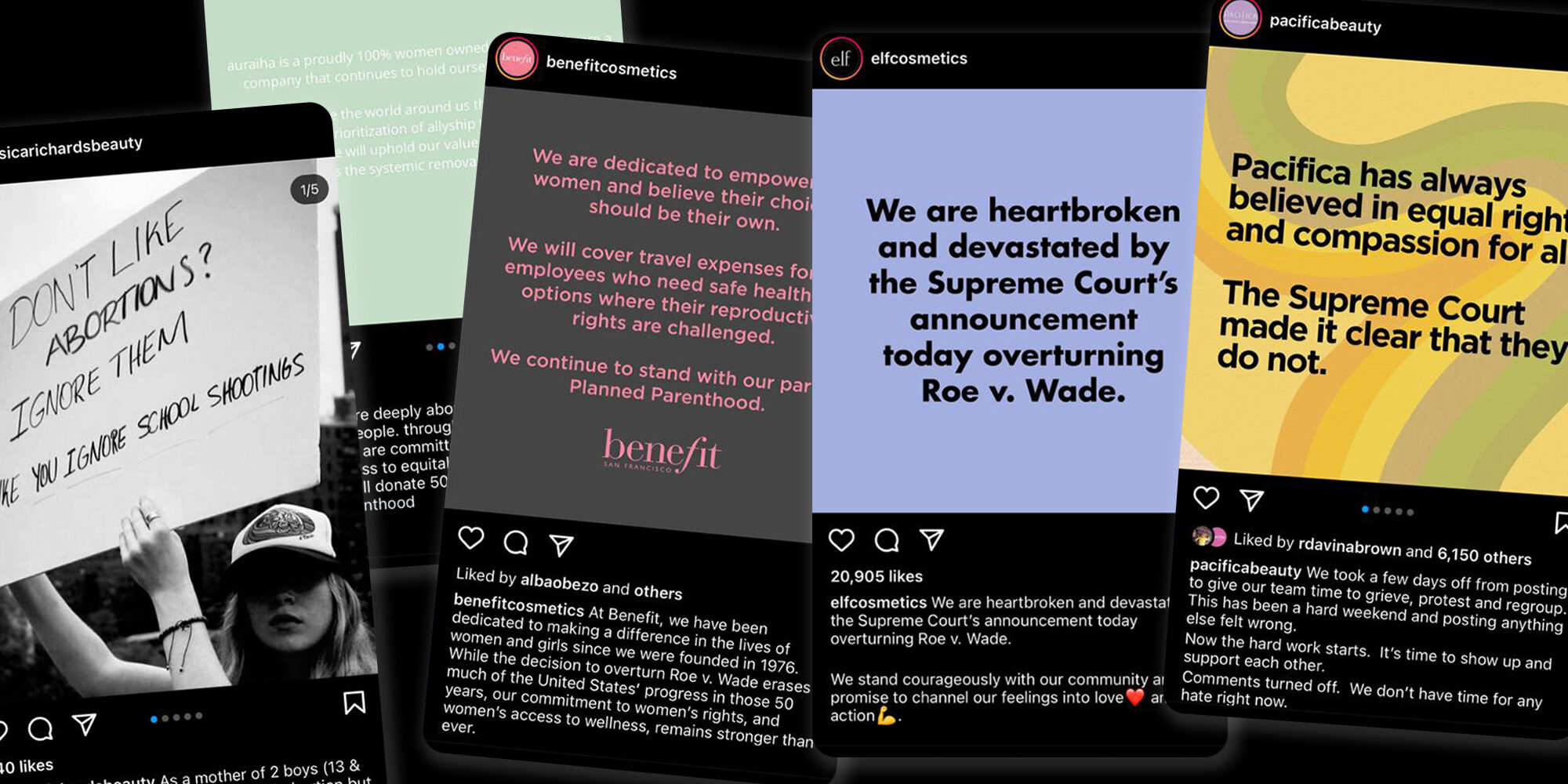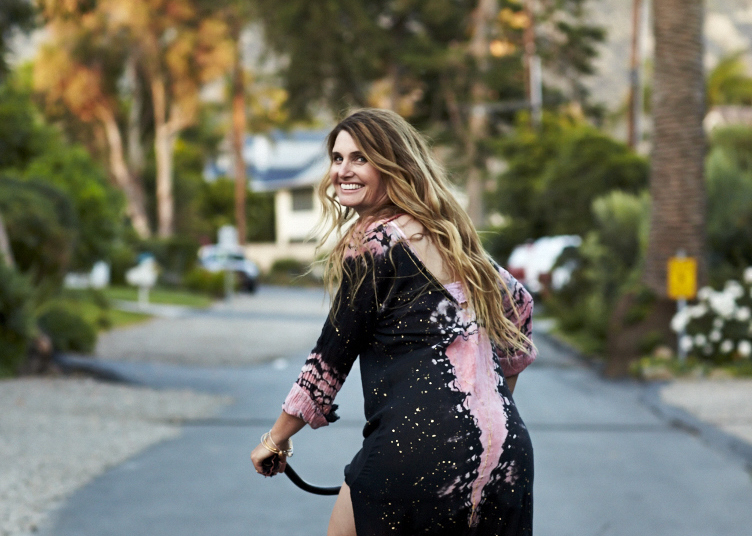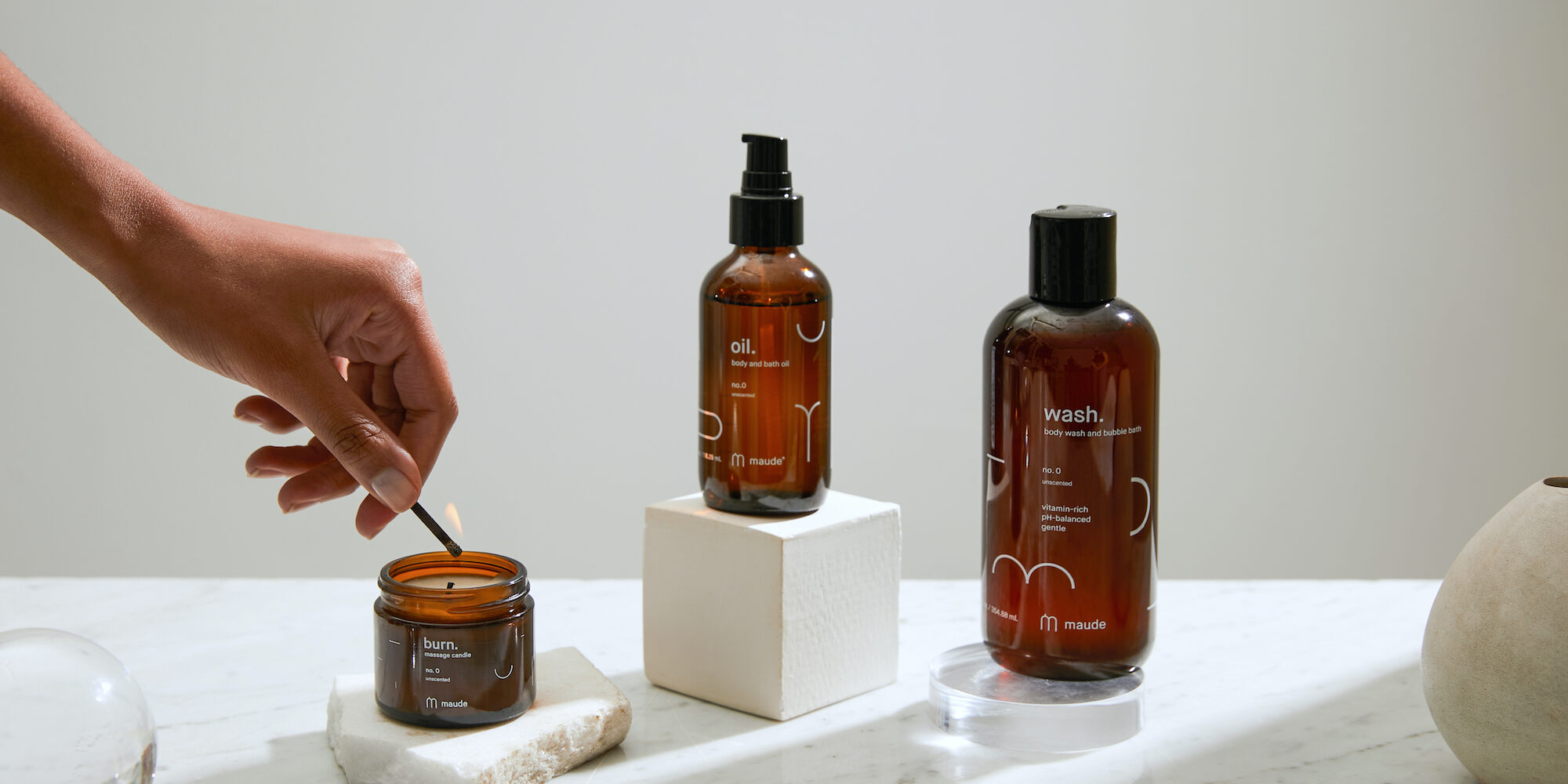
How Beauty And Wellness Brands Can Really Make A Difference In The Fight For Reproductive Rights
When the United States Supreme Court overturned Roe v. Wade last month to allow states to prohibit abortions, beauty brands were quick speak out on social media against the decision.
Benefit wrote on Instagram that it would cover expenses for employees traveling from states with abortion bans to those without to get abortions. Tatcha similarly declared its employees would receive “comprehensive reproductive healthcare benefits,” including travel cost reimbursements.
Smaller brands have been public with their responses to Roe’s fall, too. Haircare brand Amika instituted a policy offering paid leave to employees receiving abortions and covering travel and lodging expenses; soap brand Soap Distillery donated all its profits from the weekend following the decision to the Midwest Access Coalition abortion fund; clean skincare brand Auraïha announced it would commit half of July’s sales to Planned Parenthood; and body care Palermo informed its audience it will dedicate a portion of July sales to defending abortion access.
If brands were loud about reproductive rights amid broad silence, their commitments and pronouncements would clearly be seen as acts of bravery. However, those that are making commitments and pronouncements—and there are countless that remain on the sidelines due to personal opinions, anxiety about possible customer backlashes and the potential for legal consequences—are doing so as there’s a flood of them. In the noisy environment, can their actions have a lasting impact? Are they intended to? Are they mere public relations stunts? And does it matter if they are?
No doubt, the people behind brands may be horrified by toppling of Roe, but vocal brands are likely choosing to be open about their support of reproductive rights to gain customers, loyalty and sales. After all, the vast majority of beauty and wellness consumers, and the workforces at beauty and wellness companies are women. Nearly 70% of American women disapprove of Roe being overturned, per a recent CBS News/YouGov poll.
A survey conducted by YouGov and Cosmopolitan prior to the reversal of Roe found gen Z is the most pro-choice generation. Two out of three gen Zers in the U.S. identify as pro-choice, 20% higher than the national average. In light of the widespread support for the right to abortion, making pro-choice statements is a calculated move for beauty companies marketing to women, especially young women.
“Silence can be deafening. Consumers are expecting brands to take action on issues that affect their community,” says Amber Frankhuizen, founder and CEO of luxury and lifestyle marketing firm AFMKTG. “Brands feel pressured to speak out regarding social or cultural issues when, in the ‘old days,’ they might not have needed to. It’s a different time now. Consumers now vote with their dollars and decide to patronize the brands and businesses that align with their views.”
It’s for good reason that customers care about brands’ political views, as businesses regularly pour money customers give them into influencing politics, frequently in manners those customers might not favor. Companies may be less transparent about their direct or indirect (e.g., through financial contributions to lobbying organizations, trade groups or politicians) backing of corporate tax breaks, and opposition to unions, minimum wage bumps and maternity/paternity benefits, among other policies.

Fashion journalist Amy Odell, author of “Anna: The Biography,” points out in her Substack newsletter Back Row that companies like Gap, Nike and Victoria’s Secret outwardly pledge to support reproductive rights as they funnel funds to business groups behind the scenes that bolster politicians supporting the contrary. She writes, “The profits of many of these large corporations wind up in the pockets of the kinds of anti-abortion politicians who have been working for many years to rob women of reproductive freedom and therefore the right to be equal members of society.”
Still, brands feel compelled to speak (or their PR teams feel they should speak) even if their promises to the cause are social media feed deep. Éva Goicochea, founder of sexual wellness brand Maude, says, “With business and politics so intrinsically linked in this country—from corporate PAC donations all the way to cultural shifts being led by commerce—companies are in these conversations more than ever.” Maude has had connections with sexual and reproductive advocacy organizations Peer Health Exchange, Advocates for Youth, and Sexuality Information and Education Council of the United States that didn’t appear post-Dobbs v. Jackson, the decision undoing Roe.
Speaking alone only goes so far. With companies increasingly entering policy conversations, customers are wary of them doing it performatively, posting about social change without pursuing real action. “Virtue signaling online is an epidemic, and consumers are smarter than ever these days,” says Frankhuizen.
Rachel Fey, VP of policy and strategic partnerships for Power to Decide, a campaign to prevent unplanned pregnancy, emphasizes speaking out isn’t enough. “We’re grateful for these companies coming out and taking a stance on this issue, particularly considering that so many of the people who use their products are directly impacted by this,” she says. “But I think that to take meaningful action means to take that stance, but then put your actions where those words are.”
“Virtue signaling online is an epidemic, and consumers are smarter than ever these days.”
Actions can include donating to abortion funds, handling reproductive health-related expenses for employees and enacting leave policies that allow employees to get abortions without financially suffering, she says. Often, efforts begin with a brand’s treatment of its own employees, underscores Katie Diasti, CEO and founder of the menstrual care brand Viv.
“First, check in on your team. How are they really?” she suggests. “If you employ women or anyone that could get pregnant, let them know you are here to listen and support. Ask them what your company can do collectively, but also what you can do individually. Larger companies should implement greater access to necessary healthcare with benefits.”
Some brands are thinking outside the box. Makeup and skincare brand Pacifica Beauty offers nonviolent action training, bail to employees arrested for peacefully protesting the Dobbs decision and time off to volunteer for the ACLU. In addition, Pacifica gives employees time off to vote. “I see our job right now as educating and supporting the next generation of activists,” says Pacifica founder and president Brook Harvey-Taylor.
After Texas passed Senate Bill 8 last year, a law banning most abortions after about six weeks, sex toy company Emojibator offered customers 1,000 free vibrators that they could mail to people in anti-abortion states along with a postcard containing information about the law and its impact. People sent the packages to politicians like senators Ted Cruz and Mitch McConnell.

“I don’t think small business brands like ours should be expected to do the same things as larger, established companies with advertising and philanthropic budgets,” says Emojibator co-founder Kris Fretz. “I think the corporate tech world, filled with liberals and progressives, needs to band together and pay it forward by investing in more than just their own employees’ healthcare benefits.”
Nascent brands without huge budgets to donate significant amounts of money can help through educational efforts. Diasti says her brand aims to make a difference by informing people via social media about reproductive health. Another thing brands can do that has no cost is to share information about safe places people can go for abortions, says Fey.
“There is a lot of not great information out there,” she explains. “A lot of times, when somebody seeks care, they might go to Google and end up at a fake clinic—a crisis pregnancy center—so employers can also provide employees and social media followers with reliable information about where to go for abortion care.” She suggests brands direct people toward abortionfinder.org, which allows searches for clinics based on location and pregnancy duration, and identifies abortion funds to assist with payment.
Since the struggle over reproductive rights will continue for years to come, brands wanting to contribute to the cause of abortion rights should have a sustainable method to contribute over the long term, rather than simply speaking out or donating proceeds to reproductive health organizations while the topic is in the news—and customers should take note of whether brands stick to long-term initiatives.
“Follow the trail. Has the company made a donation or partnered with an organization? Are they continuing to talk about policy and equal rights all year round, or has this been a blip in their comms calendar?”
“Follow the trail,” says Goicochea. “Has the company made a donation or partnered with an organization? Are they continuing to talk about policy and equal rights all year round, or has this been a blip in their comms calendar? The best way to distinguish is to do the research and hold them accountable to what they say.”
PR does have a role in creating change, according to Diasti. “PR should be used to amplify impact,” she says. “PR can be incredible and has so much power.” When it comes to PR, though, there are right and wrong tactics. To make a statement that goes beyond virtue signaling, Frankhuizen advises brands to avoid simply reposting memes, most notably without knowing their source, and issue thoughtful statements.
It’s important to focus the issue on people at the heart of it, which often equates to not concentrating on oneself and amplifying the voices of marginalized people. Diasti says, “As a young woman of color founder myself, building a sustainable menstrual health brand, I am mindful of when I should be speaking up and when I should be passing the mic to those that need their voices amplified.”
Whatever brands can do to leverage their platform and push for change, Fey argues it’s essential for them to do it, not just because their customers are watching, but because those customers are among the people whose reproductive rights are being revoked.

“Brands can remember who it is that buys their products and make sure those people are at the center of the decisions they make as a company,” says Fey. “There are a lot of people who are going to be hurt by this, and those people tend to be people with lower incomes, people who are disproportionately facing barriers to healthcare because of systemic racism, people who struggle to travel out of state to get abortion care, and since these brands have huge platforms, they can provide information. They can support organizations, provide resources—and this is a moment to be more than just a company.”
Harvey-Taylor agrees, saying, “It is my belief that no person, no brand has the luxury to sit back and not take a stand on what is happening in the world today. To me, everything is political. When our bodies are politicized and who we choose to love is politicized, we have no choice but to participate. I don’t understand it when someone says, ‘I am not political.’ Breathing the air today is political as we face climate change, being a woman, being LGBTQI+, being a person of color—it is all political as we face losing more fundamental rights.”
KEY TAKEAWAYS
- In the wake of the recent Dobbs decision overturning Roe v. Wade, beauty and wellness brands have been speaking out in favor of abortion rights and making efforts to support those who need abortions.
- While there are certainly people at the brands earnestly horrified by the reversal of Roe, brands’ activities on and off of social media are at least in part public relations stunts as women, who account for almost all of their customers, largely approve of Roe, and they increasingly care about the politics of the brands they buy from.
- Larger companies often publicly make statements to support policies they believe their customers support while giving to groups behind the scenes that fund politicians undermining those policies.
- Social media posts alone in an environment flooded with them are unlikely to do much.
- Brands can take direct action by paying attention to their employees first and foremost, and supporting their individual reproductive choices, even if it doesn’t make a splash on social media.
- It’s important for brands to be thoughtful about taking sustainable action that lasts well beyond the immediate clamor in the wake of the Dobbs decision, educating their customers on abortion care and amplifying marginalized voices.





Leave a Reply
You must be logged in to post a comment.